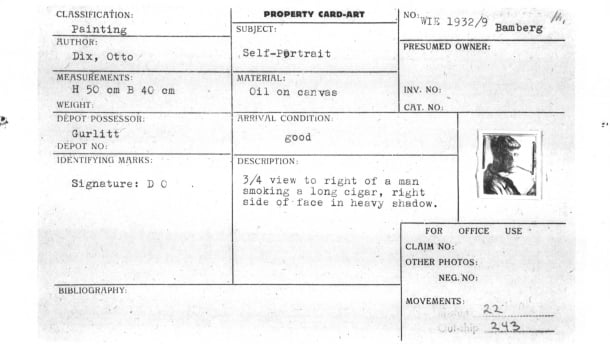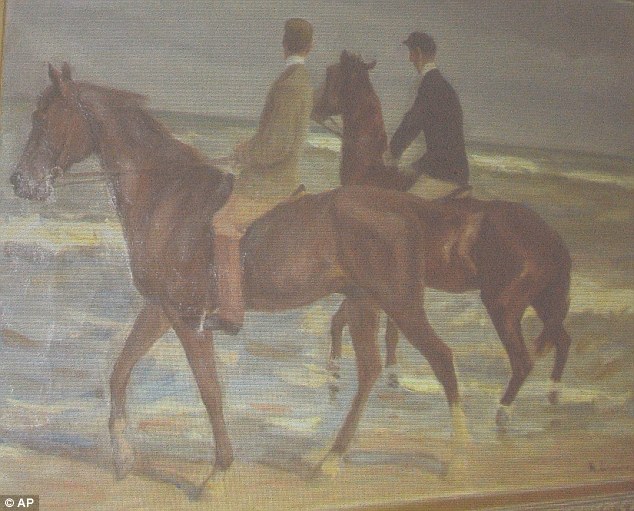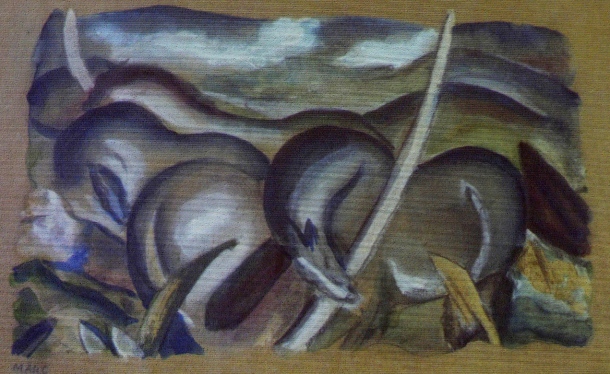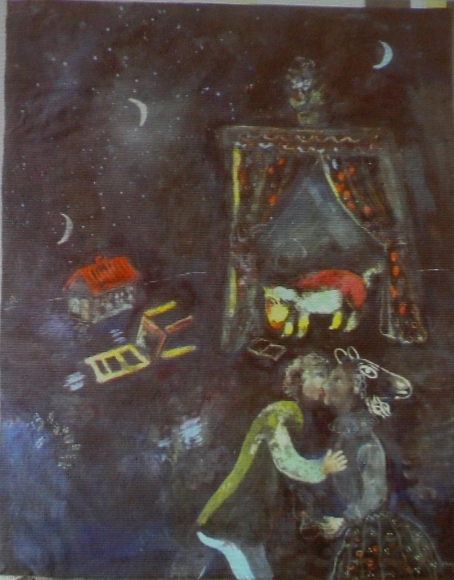The German government has released an initial list of twenty five works among the collection seized from the Munich (Schwabing) apartment of Cornelius Gurlitt, the most significant discovery of possibly looted art since the end of World War II. The list is posted at www.lostart.de, a hitherto little-known website of the Coordination Point for Cultural Losses (Die Koordinierungsstelle für Kulturgutverluste ) in Magdeburg, which administers claims for cultural losses against the German state. The website has been overwhelmed with traffic (I have yet to load the page successfully), sparking fresh criticism of the government’s handling of the issue, but giving credit where due, the Merkel government has moved swiftly to begin these disclosures. As we predicted, the national government simply could not allow this question to fester and be stonewalled; earlier this week foreign minister Guido Westerwelle noted the risk that delay posed to “trust that we have built over many decades” after World War II. The question now will be whether it continues in a comprehensive way until the full list is released.
First List of Art Found in Gurlitt Collection is Released, Website Overwhelmed as Claimants Consider Legal Options
Topics: Thinking Woman, Playing Piano, Carl Spitzweg, The Master Exploder Hantsch, Hildebrand Gurlitt, Cornelius Gurlitt, Don Quixote and Sancho Panza, Honoré Daumier, Christoph Voll, Dompteuse, Hans Christoph, Girl at Table, Holocaust Art Restitution Project, Guido Westerwelle, Max Liebermann, Antonio Canaletto, Eugène Delacroix, Tram, Nazi-looted art, Gurlitt Collection, Allegory/Allegorical Scene, View of the Seine Valley, Moorish Conversation on a Terrace, Otto Dix, Erich Fraass, Die Koordinierungsstelle für Kulturgutverluste, Wilhelm Lachnit, Entartete Kunst, Couple, Marc Chagall, Study of a Woman Nude Standing Arms Raised Hands C, Auguste Rodin, Seated Woman/Woman Sitting in Armchair, Child at Table, Magdeburg, Bonaventura Genelli, Patricia Cohen, Restitution, Fritz Maskos, Veiled Woman, Male Portrait, Female nude, Der Spiegel, World War II, degenerate art, Mother and Child, Couple in a Landscape, Ludwig Godenschweg, Théodore Rousseau, www.lostart.de, Otto Griebel, New York Times, Coordination Point for Cultural Losses, Bernhard Kretschmar, Riders on the Beach, Monk, S.A Giustina in Prà della Vale, Kunstfund München, Male Nude, Henri Matisse, Conrad Felixmüller, Woman in the Theater Box, Man and Woman in the Window
German Museums Join in Demands for More Information About Gurlitt; Links to the Amber Room Theorized; Dix Painting Was Not Unknown
Der Spiegel reports today (link in German) about how German museums are joining the chorus of frustration about the lack of information about the Hildebrand and Cornelius Gurlitt collection find. From this perspective, this development is not a surprise. I was speaking to an international law class last night at Sarah Lawrence College, and one of the students asked me what the reaction in Germany would be. My feeling was that sooner rather than later, the German museum community, and likely the federal government, will push for a forward-looking solution. Present-day Germany takes questions about the Holocaust quite seriously, and for this collection to have turned up in Germany is sparking an embarrassment that could lead to more decisive action. The problem right now seems to be that everyone is waiting for someone else to make the first move.
Topics: Jeu de Paume, unbekannte Meisterwerke, February 13 1945, FAZ, Focus, Hildebrand Gurlitt, Dresden firebombing, Max Fisher, Cornelius Gurlitt, S. Lane Faison, Linz Führermuseum, Munich Central Collecting Point, Monopol, Wiesbaden Collecting Point, Dresden, HARP, Reinhard Nemetz, Max Liebermann, WWII, Monuments Men, Gurlitt Collection, Max Beckmann, Otto Dix, Degenerate Art: The Fate of the Avant-Garde in Naz, Auktionshaus Lempertz, Entartete Kunst, Fine Arts and Archives Program, Nazis, Marc Chagall, Organisation Todt, Paul Klee, Entdeckung verschollener Kunst, beschlagnahmte Bilder, Dresdner Bank, Belvedere, Fritz Todt, Holocaust Art Project, Hamburg Kunstverein, MFAA, Roberts Commission, Angela Merkel, Restitution, Wien, Monuments Fine Arts and Archives, Selbstporträt, World War II, degenerate art, Erben, Raubkunst-Bildern, Portrait of Wally, Washi, Löwenbändiger, Austria, Franz Marc, Oskar Kokoschka, Washington Principles, Ernst Ludwig Kirchner, München, Pablo Picasso, Dr. Herman Voss, Museums, Kristallnacht, Riders on the Beach, Hans Posse, Nazi Raubkunst, Vienna, Alfred Weidinger, Henri Matisse, Self Portrait, Emil Nolde
Focus Turns to Hildebrand Gurlitt’s Postwar Interrogation; Cornelius Gurlitt’s Whereabouts. Belvedere Official Questions Whether Collection Was Really a Secret
Topics: Jeu de Paume, unbekannte Meisterwerke, February 13 1945, FAZ, Focus, Hildebrand Gurlitt, Dresden firebombing, Max Fisher, Cornelius Gurlitt, S. Lane Faison, Linz Führermuseum, Munich Central Collecting Point, Monopol, Wiesbaden Collecting Point, Dresden, HARP, Reinhard Nemetz, Max Liebermann, WWII, Monuments Men, Gurlitt Collection, Max Beckmann, Degenerate Art: The Fate of the Avant-Garde in Naz, Auktionshaus Lempertz, Entartete Kunst, Fine Arts and Archives Program, Nazis, Marc Chagall, Organisation Todt, Paul Klee, Entdeckung verschollener Kunst, beschlagnahmte Bilder, Dresdner Bank, Belvedere, Fritz Todt, Holocaust Art Project, Hamburg Kunstverein, MFAA, Roberts Commission, Angela Merkel, Restitution, Wien, Monuments Fine Arts and Archives, World War II, degenerate art, Erben, Raubkunst-Bildern, Portrait of Wally, Washi, Löwenbändiger, Austria, Franz Marc, Oskar Kokoschka, Washington Principles, Ernst Ludwig Kirchner, München, Pablo Picasso, Dr. Herman Voss, Kristallnacht, Riders on the Beach, Hans Posse, Nazi Raubkunst, Vienna, Alfred Weidinger, Henri Matisse, Emil Nolde
Merkel Hints at Putting Gurlitt Lists Online, Calls for Special Tribunal Are Made
Catherine Hickley reports from Berlin that the government of Chancellor Angela Merkel is looking into ways to put lists and/or photographs online concerning the Cornelius Gurlitt seizure of roughly 1,400 paintings with connections to Nazi looting. This followed heavy complaints in the first days of the revelation, that the government had failed to identify what has been found. The biggest question remains why this remained a secret for roughly two years since the discovery. Merkel’s government claimed yesterday it learned of the find only in the last few months.
Topics: Stephanie Barron, Jeu de Paume, unbekannte Meisterwerke, Focus, Hildebrand Gurlitt, Theo Hermsen, S. Lane Faison, Linz Führermuseum, Munich Central Collecting Point, Wiesbaden Collecting Point, HARP, Max Liebermann, WWII, Monuments Men, Alt Aussee, Gurlitt Collection, Max Beckmann, Association for Research into Crimes Against Art, Monuments, Degenerate Art: The Fate of the Avant-Garde in Naz, Albrecht Dürer, Auktionshaus Lempertz, Entartete Kunst, Fine Arts and Archives Program, Nazis, Marc Chagall, Paul Klee, Entdeckung verschollener Kunst, beschlagnahmte Bilder, Holocaust Art Project, Judge Arthur Tompkins, Roberts Commission, Angela Merkel, Restitution, 1939 Galerie Fischer auction, World War II, degenerate art, Capt. Doubinsky, Los Angeles County Musuem of Art, Erben, Raubkunst-Bildern, Altmann v. Republic of Austria, Portrait of Wally, Löwenbändiger, Marc Masurovsky, Franz Marc, Oskar Kokoschka, Ernst Ludwig Kirchner, München, Pablo Picasso, ARCA, Lawyers' Committee for Cultural Heritage Preservat, Nazi Raubkunst, Henri Matisse, Emil Nolde
New Details, More Questions Than Answers in Gurlitt Nazi-Tinged Painting Find in Munich
The Bavarian prosecutor held a press conference today to discuss the revelation this weekend in Focus that nearly 1,400 paintings had been found in the Munich apartment of Cornelius Gurlitt two years ago, after he aroused suspicion by bringing a large amount of cash back into Germany from Switzerland in 2010. This continues to shape up as the biggest restitution story in decades, perhaps ever. Among the key updates provided today by Sigfried Köble and Reinhard Nemetz, the customs official and prosecutor in charge, respectively:
Topics: Frankfurter Allgemeine Zeitung, unbekannte Meisterwerke, Focus, Hildebrand Gurlitt, Alfred Flechtheim, the Lion Tamer, Cornelius Gurlitt, Reinhard Nemetz, Anne Weber, Gurlitt Collection, Max Beckmann, Bloomberg, Otto Dix, Commission for Looted Art in Europe, Art Market Monitor, Auktionshaus Lempertz, Entartete Kunst, Meike Hoffmann, Marc Chagall, Entdeckung verschollener Kunst, beschlagnahmte Bilder, Kunsthistorikerin, Sigfried Köble, Restitution, Der Spiegel, World War II, Süddeutsche Zeitung, Erben, Raubkunst-Bildern, Löwenbändiger, München, Nazi Raubkunst
Paintings Targeted by the Nazis Found in Munich, Could be Biggest Discovery Since the War. What Now?
The German magazine Focus broke a story over the weekend that could be the biggest restitution news since Portrait of Wally or Altmann v. Republic of Austria: roughly 1,400 paintings were found in a Munich apartment that may have been seized, looted, or sold bought under duress by the Nazis in the 1930s as part of their drive to purge what they called “degenerate”—but extremely lucrative—art (the Focus coverage is extensive and excellent, though fair warning, in German). The paintings, which were apparently recovered not recently, but in 2011 as part of a customs seizure related to a currency declaration of all things, include works by Pablo Picasso, Henri Matisse, Marc Chagall, Emil Nolde, Franz Marc, Max Beckmann, Paul Klee, Oskar Kokoschka, Ernst Ludwig Kirchner, Max Liebermann and Albrecht Dürer, from collections traced back to Paul Rosenberg and others who had to abandon their property during the war, all long thought lost to the destruction of the war. They are valued in excess of 1 billion euros.
Topics: Stephanie Barron, unbekannte Meisterwerke, Focus, Hildebrand Gurlitt, S. Lane Faison, Linz Führermuseum, Max Liebermann, WWII, Monuments Men, Alt Aussee, Gurlitt Collection, Max Beckmann, Degenerate Art: The Fate of the Avant-Garde in Naz, Albrecht Dürer, Auktionshaus Lempertz, Entartete Kunst, Nazis, Marc Chagall, Paul Klee, Entdeckung verschollener Kunst, beschlagnahmte Bilder, Restitution, 1939 Galerie Fischer auction, World War II, degenerate art, Los Angeles County Musuem of Art, Erben, Raubkunst-Bildern, Altmann v. Republic of Austria, Portrait of Wally, Löwenbändiger, Franz Marc, Oskar Kokoschka, Ernst Ludwig Kirchner, München, Pablo Picasso, Lawyers' Committee for Cultural Heritage Preservat, Nazi Raubkunst, Henri Matisse, Emil Nolde






